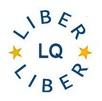Balanced scorecard at the Royal Library, Copenhagen
DOI:
https://doi.org/10.18352/lq.7756Abstract
The Royal Library is the national library of Denmark and University Library for Copenhagen University. In 2000 the Royal Library started using Balanced Scorecard as an instrument for creating a better connection between its day to day activities and its strategic goals.The Royal Library has a number of goals in choosing the Balanced Scorecard.
Important goals are:
- to develop a strategic instrument which can be used to represent the strategic goals of the library in such a way that we can measure how close our actual performance comes in reaching these goals
- to create an instrument which can be used in negotiating the goals and performance of the departments in such a way that the department leaders keep a fair level of autonomy in running the departments and give the institution leader a good overview of the actual performance
- to make the individual department's contribution to the institutional performance explicit to personnel and leaders
- to formulate and monitor important strategic areas of the library's development to support steering the development
- to make the library and its performance more transparent to all interested actors in the library
Downloads
Download data is not yet available.

Published
2003-09-22
Issue
Section
Articles
License
Copyright (c) 2003 Karl Krarup

This work is licensed under a Creative Commons Attribution 4.0 International License.
How to Cite
Krarup, K. (2003). Balanced scorecard at the Royal Library, Copenhagen. LIBER Quarterly: The Journal of the Association of European Research Libraries, 14(1). https://doi.org/10.18352/lq.7756





